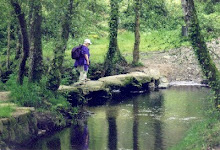My only task during the daytime will be to have a ct scan. And my chief pleasure will be to visit with several friends and former co-workers from the Kitchener-Waterloo Multicultural Centre.
Today might be an appropriate moment to share some thoughts about the impact of cancer on new Canadian individuals living in our community. My observations are grounded on my life experience living and working within multicultural communities for over forty years. There are implications for the care of persons and families affected by cancer that we need to address as a community.
Cancer (together with AIDS, which often renders the patient susceptible to cancer) is seen as the new "leprosy". There are many aspects of this condition that isolate the patient and the family, even at the very moment that the community at large wants to offer support.
Shock and horror, together with the inevitable sense of helplessness, all conspire to make for a huge power differential between the patient and others in the immediate and extended community. If one does not speak English well, if one is not familiar with the important role that volunteers play in the helping process, if our community leaders don't encourage volunteering in wider community support services, the impact on patients and families can be catastrophic.
Loss of self is something that I have heard from patients. Loss, at the same moment that the entire circle of family and friends have been saturated with the crisis. "I know that people are talking about me, wondering how I am doing, how I look. They don't talk to me they talk about me!"
There are huge expectations to "fight a good fight", to be positive, to keep hope alive. One woman said to me, "Well, I feel crappy, and I am scared that I'll die from this. I am bitter about having my hopes broken, my family life in ruins, nobody might come and play with my kids. Sometimes I feel sorry for myself, and I feel alone." Then, she added: "But don't tell this to anyone in my community!"
My first visit to a cancer patient took place in 1967, when I was a community worker among immigrants in Connecticut. I shall never forget the pain in a woman's voice as she said to me: "I lie there next to my husband, and am afraid to touch him, I could not stand his rejection. So, he lies there, afraid to touch me, in case he hurts me. A fine pair we are!" I was 23 then, what did I know? Yet I have never been able to forget her words.
For many new Canadians cancer is like a death sentence - there is a sudden awareness, a sense that one is "condemned". If one has come to this country as a refugee, there is the further bitterness of having made it to safety in Canada, only to be struck here. Cancer becomes part of your identity. People struggle with what to say. To make it better, the patient often ends up comforting others!
We all know that the human body is a time-limited offer. yet cancer seems to be much more of an intruder, more so than other conditions. We humans are not always logical about living and dying, yet there is a "cancer logic" that seems to insist that cancer is a curse. In some communities, "cancer" is a word that should not even be uttered; as if, by magic, one could bring it on oneself by uttering the word. There is a sense of blame associated with cancer that is not present in, say, MS, or CHF. Why is that?
Often new Canadians become even more isolated when they are diagnosed with cancer. The need to protect the patient becomes so overwhelming that doors are closed to the very activities that could make life more positive. If social activity, living within community, is what makes you feel most alive, how can we ensure that such participation is still available to a person who has cancer?
Where is God in all this? When do we begin to give the message that life is short, always too short, but ever so precious? When do we begin to acknowledge that quality, not length, of life is a patient's right, not a luxury? When do we begin to acknowledge that education about how to relate to a loved one who has cancer is a huge part of the healing process? What does "teach us to number our days so that we may grow in wisdom (Ps. 90:12) really mean in this context?
It is time I got going, but we will see each other around, meeting many others, and speaking many languages, on the way to Santiago!
Subscribe to:
Post Comments (Atom)

No comments:
Post a Comment